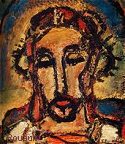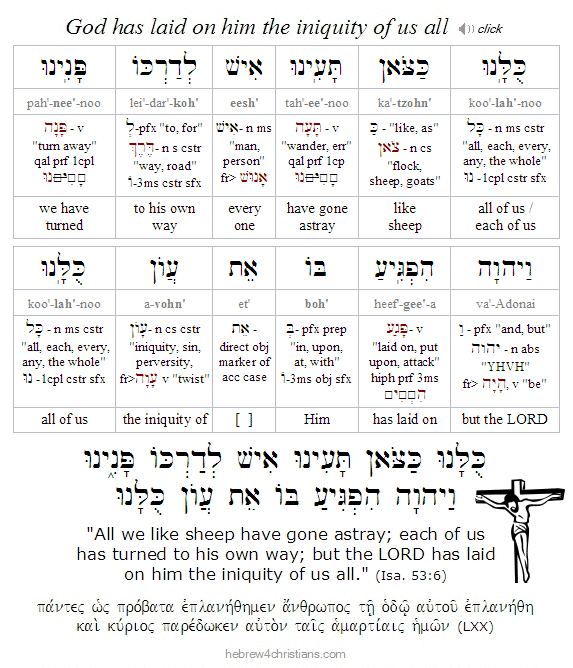|
The Talmud says "All the world was created for the Messiah" (Sanhedrin 98b). The New Testament had earlier said the same thing: "All things were created by Him (i.e., Yeshua), and for Him" and in Him all things consist (συνεστηκεν, lit. "stick together") (Col. 1:16-17). Indeed, all of creation is being constantly upheld by the word of the Messiah's power (Heb. 1:3). Creation begins and ends with the redemptive love of God as manifested in the Person of Yeshua our LORD... The Messiah is the Center of Creation - its beginning and end. As it is written: אָנכִי אָלֶף וְתָו רִאשׁוֹן וְאַחֲרוֹן ראשׁ וָסוֹף / "I am the 'Aleph' and the 'Tav,' the First and the Last, the Beginning and the End" (Rev. 22:13). "For from him and through him and to him are all things. To him be glory forever. Amen" (Rom. 11:36). Yeshua our Messiah is called מֶלֶךְ מַלְכֵי הַמְּלָכִים / Melech Malchei Hamelachim: The "King of kings of kings." He is LORD of all possible worlds -- from the highest celestial glory to the dust of death upon a cross. יְהִי שֵׁם יהוה מְברָךְ / yehi shem Adonai mevorakh: "Let the Name of the LORD be blessed" forever and ever (Psalm 113:2). So while we can agree with the Talmud's general statement that the world was created for the Messiah, we would insist that the Messiah is none other than Yeshua, God's Son, and indeed, the Messiah could be no other...
It is tragic that traditional Judaism does not include Isaiah 53 as part of its yearly Haftarah readings. Perhaps the sages got confused about how to interpret the prophet. This shouldn't surprise us, however, since the prophets were regularly misunderstood and persecuted by various "religious authorities" in Jewish history (see Luke 11:47-51). Still, the sages might have missed the coming of Yeshua because there are two distinct pictures of the Messiah revealed in the visions of the prophets. On the one hand, Messiah is portrayed as a great king, deliverer, and savior of the Jewish people who comes in triumph "in the clouds" (Dan. 7:13), but on the other he is depicted as riding a donkey, lowly and humble, a suffering servant, born in lowliness, despised and rejected of men (Zech. 9:9). These two visions of Messiah eventually led to various oral traditions that there would be two Messiahs: a Messiah ben Joseph (מָשִׁיחַ בֶּן־יוֹסֵף) and a Messiah ben David (מָשִׁיחַ בֶּן־דָוִד). In other words, the sages split the concept of Messiah in two, "dividing the visions," by regarding one Messiah as a sufferer and the other Messiah as a conqueror.
Messiah ben Yosef is identified with the Suffering Servant, of whom the patriarch Joseph prefigured (and of whom Isaiah plainly spoke in his four "Servant Songs"). In some traditions of Judaism, Messiah ben Yosef is recognized as a forerunner and harbinger of the final deliverer, Messiah ben David. Ben Yosef suffers for the sins of Israel and ends up getting killed in the battle against evil for the benefit of ben David (in this way, the two ideas of Messiah were attempted to be "connected" - though not unified). In the Talmud it is written, "When will the Messiah come?" And "By what sign may I recognize him?" Elijah tells the rabbi to go to the gate of the city where he will find the Messiah sitting among the poor lepers (Sanhedrin 98a). "The Messiah -- what is his name?... The sages say, the Leper Scholar, as it is said, 'surely he has borne our griefs and carried our sorrows: yet we did esteem him a leper, smitten of God and afflicted...'" (Sanhedrin 98b). These statements concern the idea of Messiah ben Yosef...
Messiah ben David, on the other hand, is identified as the great military ruler and King of Israel of whom King David prefigures. This greater "son of David" will regather the exiles, set up the (Third) Temple, and deliver Israel from all her enemies. This is the "Shiloh" version of Messiah that the sages of Judaism (such as Maimonides) have long been expecting (for more on the vision of Zion, see "As the Day Draws Near"). Christians (and Messianic Jews) believe Yeshua the Messiah in His second coming will completely fulfill this description of Messiah ben David.
The sages apparently were unwilling to unify the various Messianic prophecies in the Tanakh and therefore chose to "divide the visions." Ironically, while they longed for the ideal of Zion to be finally realized, they missed the means by which Zion itself would be established. They did not comprehend that the prophecies concerning the one Messiah would be fulfilled in two distinct ways: Yeshua is both Ben Yosef (the Suffering Servant - at His first coming) and Ben David (the Reigning King - at His second coming). He is also the Anointed Prophet, Priest, and King as foreshadowed by other me'shichim (משיחים) in the Tanakh. Both traditional Jews and Christians are therefore awaiting for the appearance of the Messiah - though His followers will joyfully welcome Yeshua back!

"And of the Messiah -- what is his name?... The early sages answer, the "Leper Scholar" (מלומד מצורע)..." (Sanhedrin 98b). How was it that Yeshua was able to touch the metzora ("leper") and yet remain clean himself (Matt 8:1-4) unless he the LORD our Healer, the "the learned leper"? Just as Yeshua spoke with greater authority than Moses (Matt. 5:21-48), so He was able to do what Moses (and those under the Levitical system of worship) could not do -- namely, reach down in compassion and take away the uncleanness from our lives.... Yeshua's blood creates the "waters of separation" (מֵי נִדָּה). He is the fulfillment of the "Red Heifer" sacrifice. Only Yeshua enters the "leper colony" of humanity and takes away our tzara'at (sin) by becoming ish machovot (אישׁ מַכְאבוֹת), a leper Himself, the Just for the Unjust, that He might make us acceptable before the LORD.
As the prophet Isaiah wrote of Messiah:
"He is despised and rejected of men, a man of pains (אִישׁ מַכְאבוֹת) and acquainted with sickness (וִידוּעַ חלִי), and we hid as it were our faces from him. He was despised and we esteemed him not. Surely he has carried our sicknesses (חֳלָיֵנוּ) and borne our pains (מַכְאבֵינוּ), yet we esteemed him as plagued (נָגַע), smitten of God (מֻכֵּה אֱלהִים) and oppressed. But he was pierced (מְחלָל) for our transgressions (פְּשָׁעֵנוּ), he was crushed for our iniquities (עֲוֹנתֵינוּ): the discipline for our peace was upon him (מוּסַר שְׁלוֹמֵנוּ עָלָיו); and in his blows we are healed. All we like sheep have gone astray; we have turned every one to his own way, but the LORD has attacked in him (הִפְגִּיעַ בּוֹ) the iniquity of us all" (Isa. 53:3-6)
"The LORD has "attacked in him (הִפְגִּיעַ בּוֹ) the iniquity of us all..." (Isa. 53:6). Through the substitutionary sacrifice of the righteous Suffering Servant, Yeshua, we are both forgiven and made free from the power of sin and death. Because of Him we are no longer "lepers" or outcasts from the community of God but are made clean through His loving touch.
Hebrew Lesson
Isaiah 53:6 reading (click):
 |
Addendum: Jewish tradition states that teshuvah (repentance) was created at twilight just before the first Sabbath (Berachot 54a), that is, concurrent with the creation of Adam and Eve (see the "Gospel in the Garden"). Repentance is a response to sin, which is understood as a form of spiritual sickness that leads to death: "Bless the LORD, O my soul, and forget not all his benefits, who forgives all your iniquity, who heals all your diseases, who redeems your life from destruction, who crowns you with chesed and mercy" (Psalm 103:2-4). God's forgiveness is linked with healing and redemption from death and destruction (שַׁחַת). "By his stripes you were healed" (Isa. 53:5).
It is written: "God creates the cure before the plague." Just as God created mankind only after He created the pathway of repentance (i.e., Yeshua is described as the "Lamb slain from the foundation of the world": 1 Pet. 1:20, Eph. 1:4, Rev. 13:8, 17:8), so the purification from sin and death was likewise foreseen and provided for by means of the Cross of the Messiah. God chose to save the "leper colony" of humanity by bearing the sickness Himself: "For we do not have a high priest who is unable to sympathize with our weaknesses (ἀσθένεια), but one who in every respect has been tempted as we are, yet without sin" (Heb. 4:15).
Related:
|




